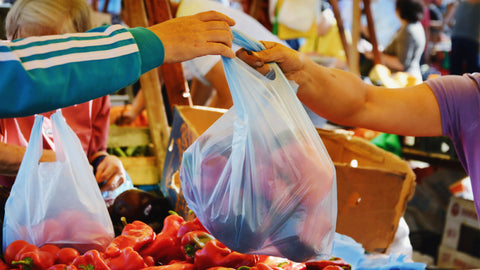Your Cart is Empty
**FREE (PLASTIC-FREE) SHIPPING OVER $89 IN AU | $9.95 FOR AU ORDERS BELOW $89**
Menu
-
- BRANDS
- New
-
A - F
- Aleph Beauty
- Amavasya Healing Store
- Baby Quoddle
- Banksia Pods
- Bare and Boho
- Bear & Kind
- Bearded Chap
- Beauty and the Bees
- BioTuff
- Brightberry
- Buchi Brew Co
- Byron Bay Detox
- Chubby Bee
- Coconut Bowls
- Core Skincare
- Desert Shadow
- Downunder Wash Co
- Earth Greetings
- Eco Coconut
- Eco Art & Crafts
- Eco Max
- Eco Modern Essentials
- Eco Toothbrush
- Ecyo
- Eden Health Foods
- Ethique
- Ever Circle
- Ever Eco
- E.sup
- Femme Organic
-
G - N
- Gentle Habits
- Go for Zero
- Goodeau
- Good Change Store
- Good Cuppa
- Green Grip
- Haakaa
- Here and After
- Honeybee Wraps
- Honeysticks
- Ilo Wellness
- IME
- Jack n' Jill
- Kayu & Co
- Kelpy Bone
- Kiin Baby
- Kooshoo
- Laminated Cotton Shop
- Left-handesign
- Love Beauty Foods
- Magic Earth
- Mika Creations
- Miod
- My Mimi
- Natural Rubber Soother
- No Nasties
- Noosa Basics
- Notely
- Nuebar
- Nutra Organics
- Nurtur Tea
-
O - S
- One Chew Three
- Paper Saver
- Patch
- Planet Revive
- Pleasant State
- Pod Star
- Poppy and Daisy Designs
- Raw Medicine
- Resparkle
- Retro Kitchen
- Rosie Lou
- Rustic Peppermint
- Salty Aura
- Saver Sleeve
- Scoop Whole Beauty
- SealPod
- Shampoo with a Purpose
- Sileco
- Solid Oral Care
- Sow n Sow
- StokedNZ
- Strap
- Stray Willow
- Sunbutter
- Surfmud
-
T - Z
- Tappwater
- That Red House Soapberries
- The Australian Natural Soap Company
- The Fabric Comb
- The Glitter Tribe
- The Loose Tea Company
- The Naturool Co
- The Physic Garden
- The Swag
- The Tooth Faerie
- Thrive Tallow
- Togo Sun
- TOMbag
- TOM Organics
- Tooletries
- Urban Composter
- Urban Greens
- Urthly Organics
- Veggie Saver
- Viva La Body
- We Might Be Tiny
- Winki Zinc
- Woohoo
- Wotnot
- ZeroCare
- Zone Yoga
- ✨ SUBSCRIBE & SAVE
- 💕 Valentine's Gift Guide
- SKINCARE & MAKEUP
- BATHROOM
- HOME
- FAMILY
- Zero Waste packs & Gifting
- SALE
- BLOG
- ABOUT US
-
- Login / Subscribe
-
Australia (AUD $)

**FREE (PLASTIC-FREE) SHIPPING OVER $89 IN AU | $9.95 FOR AU ORDERS BELOW $89**

India Begins to Ban Single-Use Plastics & Holds Manufacturers Accountable…
July 21, 2022 2 min read
India Begins to Ban Single-Use Plastics & Holds Manufacturers Accountable…
This week we are in for a goodie!
That's right, you read correctly! New Delhi - India, a nation of over 1.4 billion people, has placed bans on selected single-use plastic products, we will share which ones soon…
But that's not all! While some of the plastics not on the list will remain and are not covered by the ban, the aim will be to firmly hold manufacturers that fall into that category accountable for recycling their materials after use.
This nationwide ban will also include prohibiting producing and importing such single-use plastics! YES!
Here's the latest…
In 2020, India generated an unfortunate 4.1 million metric tons of plastic waste due to the waste management systems in the country's cities and villages. To put that in comparison, on average, 3.5 million tonnes of plastic waste is created in the whole of Australia every year…
While finding solutions to its waste management is going to be crucial, it’s cutting the plastics at its source that is going to be the key for India to meet its climate goals as well as. India has one of the world's highest pollution rankings, and its mission to meet its reduction target has only intensified. India's goal is to reduce emissions in economic activity by 45% in the next eight years.
Which single-use plastics have been banned?
- Plastic stick earbuds
- Plastic bags
- Candy sticks and ice cream sticks
- Polystyrene (Thermocol) for decoration
- Plastic plates, cups, glasses, cutlery such as forks, spoons, knives, straws, trays
- wrapping or packaging films around sweet boxes
- Invitation cards
- Cigarette packets
- Plastic or PVC banners less than 100 micron
- Plastic Stirrers
- Plastic sticks for balloons
And that's to start!
What are the next steps?
The ban's success will now depend on its implementation. While the ban is a great beginning, it will also need to see the availability of alternatives like bamboo increase for the people to avoid confusion and resistance from consumers and vendors.
Even though there are still many other plastic products — like bottles for water or soda or bags of chips — that aren't covered by the ban, the federal government has set targets for manufacturers to be responsible for recycling or disposing of them after use.
Plastic manufacturers had appealed to the government to delay the ban, citing inflation and potential job losses. But India's Federal Environment Minister Bhupender Yadav said at a press briefing in New Delhi that the ban had been in the pipeline for a year.
"Now that time is up," he said. BOOM. Chills!
We told you it was a goodie!
If you loved this story, we know you'll love our story about WA on track to end coal-fired power! Head to our Happy Earth News Blog here to see more!
GFZ Team x
Leave a comment
Comments will be approved before showing up.
Recent Articles
- Game, Set, Reuse: How Bettercup Transformed Sustainability at the Australian Open February 04, 2026
- Football Goes Fully Electric: Oxford United’s Stadium Sets a New Standard for Sustainable Sport January 29, 2026
- First Nations Owned Businesses to Support This January and Beyond January 22, 2026
- Roadside Rubbish Relics: Meet The Locals Making WA Roads Cleaner January 15, 2026
- From Festival Fields to Fresh Starts: How Abandoned Tents Are Finding a Second Life January 08, 2026
Subscribe
Sign up to get the latest on sales, new releases and more …

